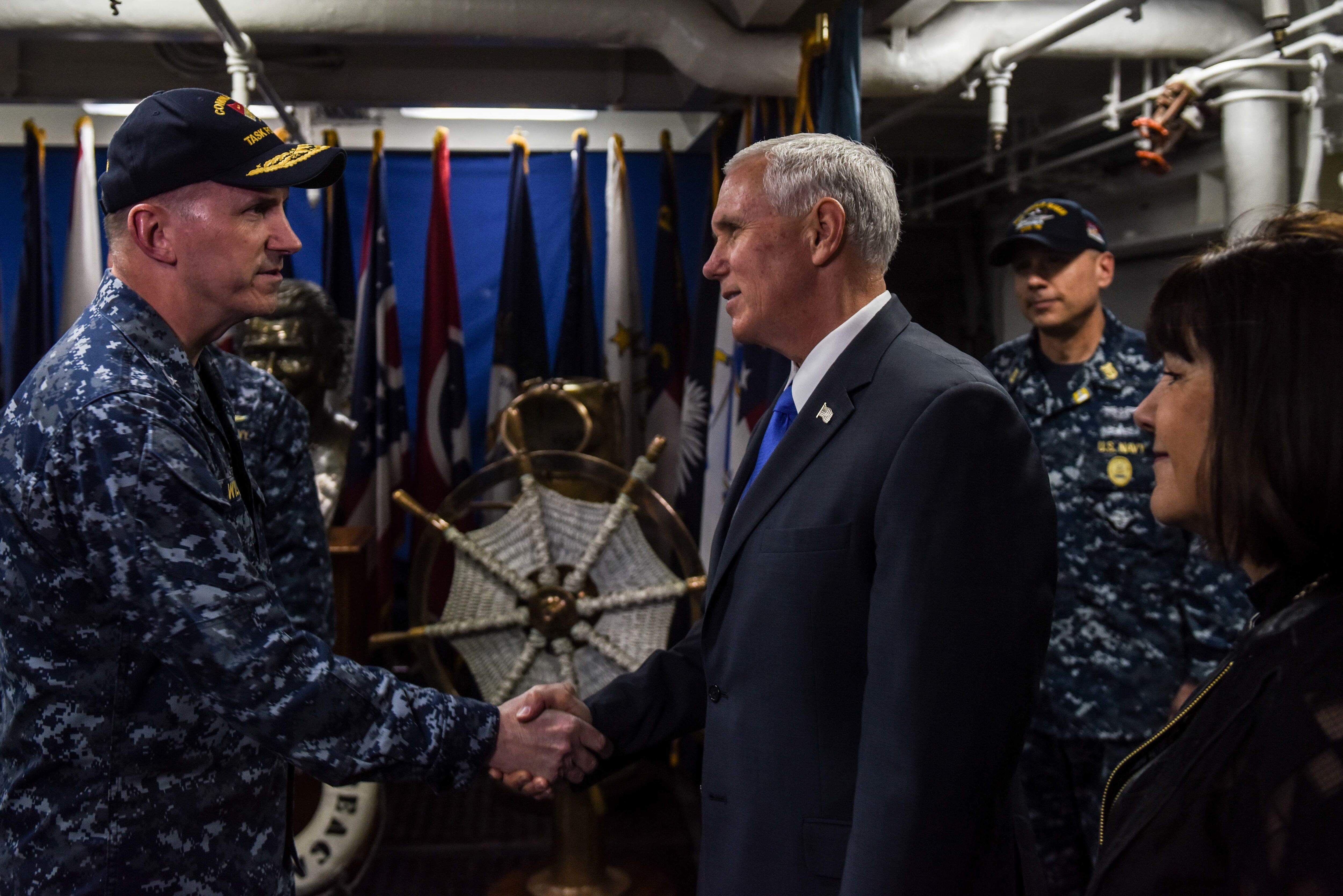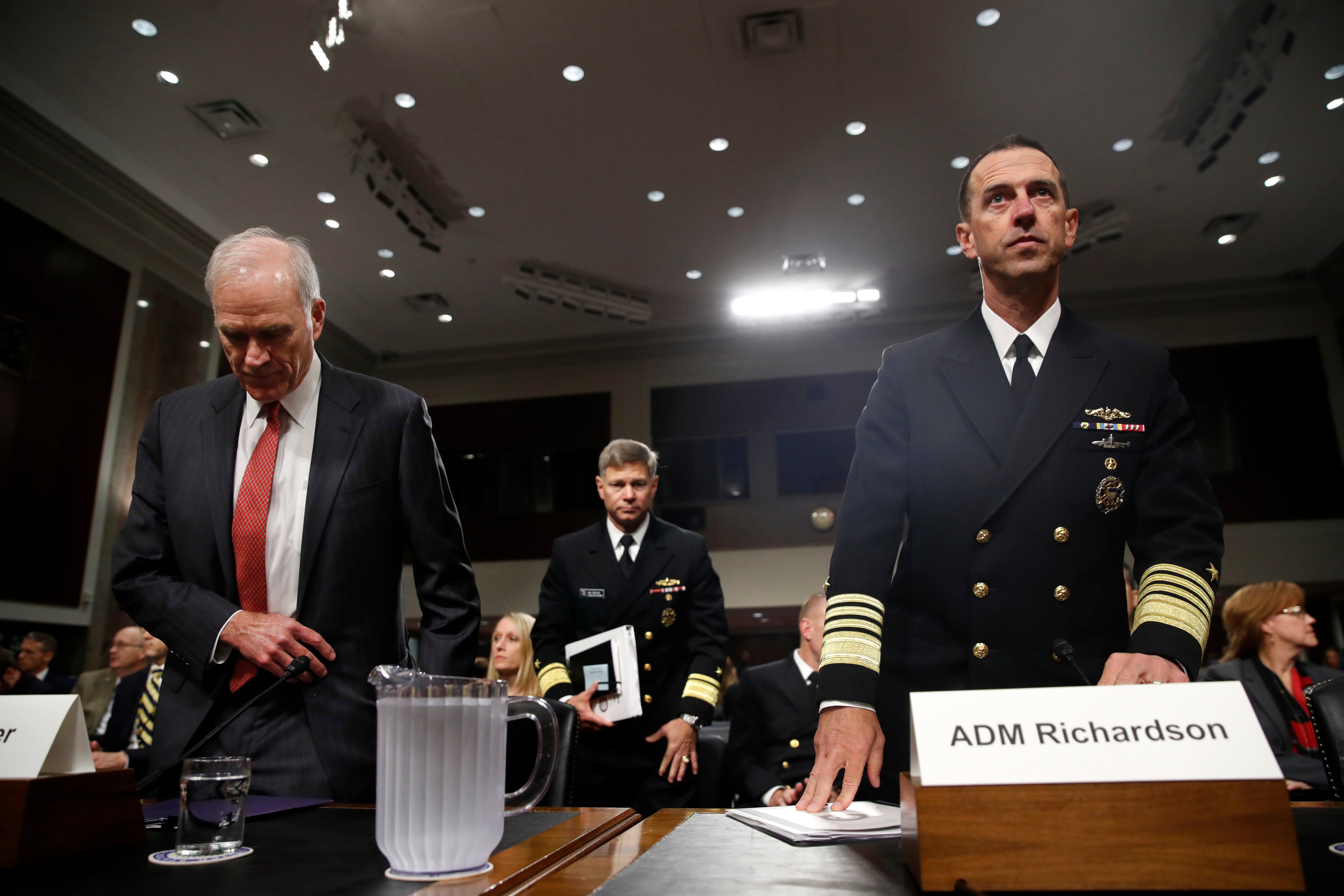The Navy has issued 20 reprimands to officers and enlisted sailors in the wake of three major collisions in 7th Fleet waters this year that include the fatal disaster involving the destroyer Fitzgerald, Senate Armed Services Committee head Sen. John McCain said Tuesday during a hearing on Navy readiness.
Administrative actions including non-judicial punishment and relief for cause have been undertaken against 20 skippers and sailors from several ships involved in incidents this year, with most stemming from the June 17 Fitzgerald collision that killed seven sailors.
No sailors from the destroyer John S. McCain, which collided with an oil tanker in August and resulted in the deaths of 10 sailors, have been charged or disciplined thus far, according to officials.
News of the disciplinary tally follows Monday’s firing of a two-star admiral and a squadron commander by the new head of the Navy’s troubled 7th Fleet.
Vice Adm. Phil Sawyer, who took over 7th Fleet last month after fellow three-star Joseph Aucoin was relieved, fired Task Force 70 commander Rear Adm. Charles Williams and Destroyer Squadron 15 commander Capt. Jeffrey Bennett Monday.
A brief 7th Fleet release cited a loss of confidence in the abilities of Williams and Bennett to command.
RELATED

Vice Chief of Naval Operations Adm. Bill Moran said in August that the Navy planned to discipline up to a dozen Fitzgerald sailors, including the skipper, in connection with the ship’s June 17 collision with a merchant vessel off the coast of Japan that led to seven sailors drowning.
No disciplinary action against any McCain sailors has been publicized to date.
The Arizona Republican’s allusion to the reprimands came during an hours-long hearing, where Chief of Naval Operations Adm. John Richardson, Navy Secretary Richard Spencer and a government watchdog head fielded questions from an armed services committee that seemed flabbergasted by the extent of the Navy’s readiness issues.
Several lawmakers questioned why recommendations made by the Government Accountability Office over the years had not been implemented by the Navy.
McCain called it “troubling” and “unacceptable” that 37 percent of Japan-based destroyer and cruiser certifications were expired as of June.
“As leaders of our Navy, you must do better,” he said.
Richardson said his fleet-wide review in the wake of Fitzgerald and McCain collisions, which claimed the lives of 17 sailors total, will be completed by the end of October.
He also said the service is not waiting on that review to make changes.
Ships transiting in high-traffic waters of the West Pacific are now activating the automatic identification system, or AIS, which tracks the movement of commercial vessels, Richardson said.
“We had a distorted perception of operational security, that we kept that system off our warships,” he said. “One of the immediate actions following these instances is that in particularly heavy areas, we’re going to turn it on.”
Richardson said AIS use in such situations poses no operational security issues because “you can look outside and see the ship.”
Material inspections of ships are also underway, he said.
The GAO has issued 14 recommendations in the past three years to improve readiness, GAO Defense Capability and Management Director John Pendleton said at the hearing.
Recommendations included urging the Navy to assess the pros and cons of basing ships overseas, as well as revising deployment schedules, among others, he said.
“DOD and Navy agreed with us, at least on paper,” Pendleton said. “But they’ve taken little action to implement our recommendations.”
McCain asked Richardson about the fact that the GAO has been warning of Navy deficiencies for years.
“How do you explain that, admiral?” McCain said.
Richardson responded that he had “no explanation,” but that the service remains committed to closing such shortfalls and is not sitting idle.
Senators on both sides of the aisle lamented the effects of sequestration and continuing resolutions, legislative moves that have brought spending cuts and uncertain funding streams to the military branches.
Spencer called such moves and their effects on the Navy “very disturbing.”
Richardson again said there is no indication to date that the Fitzgerald or McCain were the victims of a cyber-attack. adding that he had just gotten an update from a team dispatched to the McCain, and that there was “still no evidence of any intrusion or tampering yet,” and that the investigation continues.
Navy leadership also answered questions on the readiness of ships home-ported overseas and the lack of training for those crews.
Sen. Richard Blumenthal said having expired certifications on those ships increase from under 10 percent to 37 percent “in just two years is pretty staggering.”
“Most Americans find these crashes incomprehensible,” the Connecticut Democrat said.
When it comes to the perennial lack of sleep and extensive work hours plaguing ship crews, Richardson said alternatives are being studied to allow crews to get rest that better aligns to the body’s natural rhythms.
McCain thanked the panelists for their efforts but bemoaned the lack of quick, immediate action that could help mitigate some shortfalls.
“If we know that somebody’s working a 100-hour work week, I’m not sure we need a study,” he said.
“When somebody’s working 100 hours a week over a period of time, they’re going to make mistakes,” McCain said. “Any manager can tell you that.”
Committee members and the Navy panelists also discussed the Navy’s so-called “can do” culture, and how perhaps too much has been piled on the sea service’s plate.
“No one’s taking a rock out, and the rucksack’s getting pretty damn heavy,” Spencer said.
Geoff is the managing editor of Military Times, but he still loves writing stories. He covered Iraq and Afghanistan extensively and was a reporter at the Chicago Tribune. He welcomes any and all kinds of tips at geoffz@militarytimes.com.





